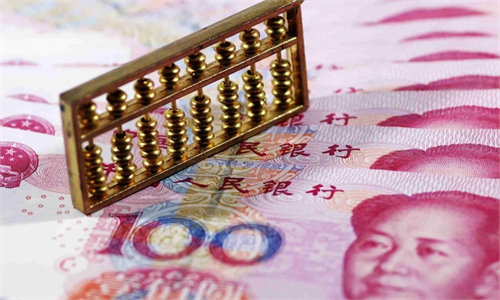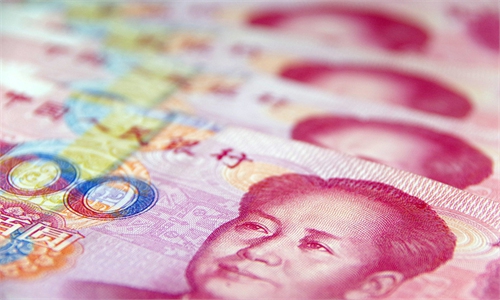
Illustration: Chen Xia/Global Times
China's currency has continued to rally, hitting a four-month high against the US dollar on Friday, apparently buoyed by the country's move to optimize its COVID-19 response and reopen its borders to revitalize the world's second-largest economy. On Friday, the country's central bank set the USD/CNY central parity rate at 6.8912, but the onshore and offshore currency markets saw USD/CNY both close at roughly 6.83 - exposing the strong buying of the yuan.
As policymakers are focused on wider financial sector opening-up and deeper economic integration with the outside world, the yuan will naturally gain value and strength as more central banks buy and stock Chinese assets as their foreign currency reserves, while a growing number of international companies will use the yuan to settle trade of oil, natural gas, ore, manufactured items and farm produce.
The IMF reported that the use of Chinese yuan in global central bank reserves has continued to increase, while holdings of the US dollar dropped from 70 percent in 2000 to less than 60 percent in early 2022.
China's capital markets are being enthusiastically embraced by international investors. For instance, during the first four trading days of 2023, net capital inflows through the "northbound trading link" system into purchasing A-shares on the Chinese mainland exceeded 20.1 billion yuan ($2.93 billion). Chinese equities and bonds are now considered safe-haven assets, being snapped up by avid investors.
The most significant driver of the yuan comes from China's brightening economic prospects for 2023, as the downgraded COVID response will lead to an all-around economic recovery throughout the year, Chinese economists said. They forecast the redback is likely to rise to 6.6-6.7 against the greenback at the end of the year. It may become even firmer, backed up by a rapidly developing economy.
With the constant weakening of the US Dollar Index, a measure of its value relative to a basket of other major foreign currencies, since September, the yuan has steadily appreciated in value. The Dollar Index rose to a high of 114.78 on September 28, but retreated in the fourth quarter. Accordingly, the yuan gained more than 4,900 basis points in the past three months, a stellar performance for a major emerging market economy's currency.
The broad market consensus goes that the US Federal Reserve will raise the benchmark interest rates by a total of 75 basis points in 2023 - 25 bps apiece - before the central bank pauses raising rates in the third or fourth quarter, bringing the current cycle of US financial tightening to an end. In addition to interest rates, there exist other factors that could impact the US dollar's value, say, an abrupt economic recession or another financial or fiscal debacle, which will cut deeply into the value of the greenback. And, if the Japanese or European central banks reverse course and move to tighten policy, the downside pressure on the dollar will be exacerbated.
To add an anecdote, the US government, in 2022, moved to weaponize the greenback to enforce sweeping sanctions on Russia, including freezing hundreds of billions of US dollar-denominated assets. It immediately rang the alarm bell, awakening other governments in the world and giving fresh impetus for other sovereign countries to explore ways to circumvent the US currency.
Coming back to China, it's a "huge positive" for the country to do away with previous set of strict pandemic-related restrictions and reopen borders to the rest of the world as global investors bet on a strong economic revival following the anti-COVID policy shift in December.
For an example, the country's Ministry of Transport, based on ticket bookings, said it expects 2.095 billion passenger trips during the coming 40-day Spring Festival travel spree, increasing 99.5 percent from last year. And, their spending will rise correspondingly. A full-throttled recovery is in the pipeline.
To provide better financial services, China's central bank and the State Administration of Foreign Exchange decided to extend trading hours for onshore yuan trading from January 3, in an effort to increase international use of the yuan. Now, foreign exchange transactions are extended until 3 am Beijing time the next day, instead of 11:30 pm service cutoff that was previously in place. The yuan has kept climbing since the new policy was announced on December 30.
The trading hour extension, which Chinese officials said will help explore "the width and depth of onshore and offshore yuan trading," will provide increasing convenience to traders and investors all over the world, particularly in the Middle East, Central Asia and Europe.
A few Western media outlets have started to spin China's new policy, claiming the country's de-dollarization campaign is being accelerated. However, as the world's second-largest economy and the largest commodities trader, China is entitled and duty-bound to make the yuan more easily available and transferrable in transactions and settlements.
A recent survey by the Bank for International Settlements (BIS) showed that the yuan was involved in merely 7 percent of all goods trades in 2022, compared with the dollar's 88 percent. So this country still needs to do more to increase international use of the yuan, while constantly shore up the currency's global appeal.
The author is an editor with the Global Times. bizopinion@globaltimes.com.cn



